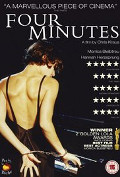
Germany 2006
Directed by
Chris Kraus
112 minutes
Rated MA
Reviewed by
Bernard Hemingway

Four Minutes
Synopsis: 80-year-old Miss Kruger (Monica Bleibtreu) has worked at the same women’s prison ever since she started there as a nurse during WWII. Now a stern old spinster she teaches classical piano to a few of the inmates. One day Jenny (Hannah Herzsprung), a violent young woman incarcerated for murder arrives and Miss Kruger’s staid and ordered world is turned upside down
Because of its expressive range the piano is an instrument that bears the brunt of human tragedy like no other: The Piano (1993), The Pianist (2002), The Piano Teacher (2001) are examples that readily come to mind that make use of it. Writer/director Chris Kraus’s Four Minutes, with its mix of troubled women and nasty Nazis fits well within this tradition.
Whilst with its desaturated colours and grainy look, Four Minutes is a film that impressively matches form and content it also often feels over-burdened by a recurring back-and-forth time structure and a tendency to fall back on familiar cinematic conventions. It is, nevertheless, distinguished by its outstanding lead performances.
Herzsprung, as the young woman with a prodigious musical talent, grabs one’s attention with her pent-up anger that seems permanently on the verge of exploding (and often enough does) whilst opposite her, Bleibtreu, with her sensible old lady’s garb and buttoned up ways is her prim antithesis. Although the former, with her tilt at redemption, is the focus of the narrative it is really the older woman who is the principal subject of the film. Thus we are privy to Miss Kruger’s memories of a lesbian love affair, Jenny’s father confesses his incestuous relationship with his daughter to her and she catches the head prison guard in amorous tussles with his ex-wife, all aspects which combine to give us stronger connection to her than is the case with the emotionally-damaged Jenny.
Although it is the dynamic between the two women that catalyzes the changes for both of them, as befits their intensely restrained/repressed characters, Kraus makes the transformation evident more through internal, attitudinal changes manifested through small concessions in their defences, rather than strong characterological or dramatic shifts. Particularly given the generic tendencies of the story, this a strength for the film, which shines mostly due to the fact that its significant ideas are referred to allusively rather than being hammered home (although the referernce to “negro music” was overplayed). And for anyone feeling that the film tended to be over-reliant on the tried-and-true, the climactic tour de force performance by Jenny (of a piece by the film’s composer Annette Focks) is a wonderful surprise that in giving the film its title is sadly too short.

Want more about this film?


Want something different?




